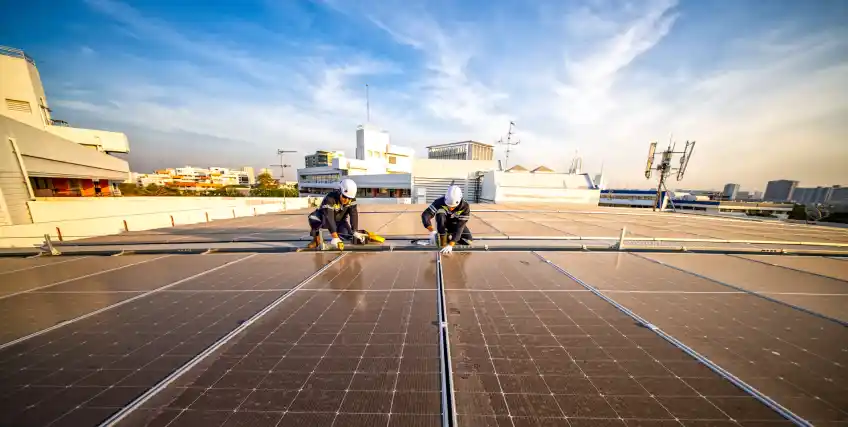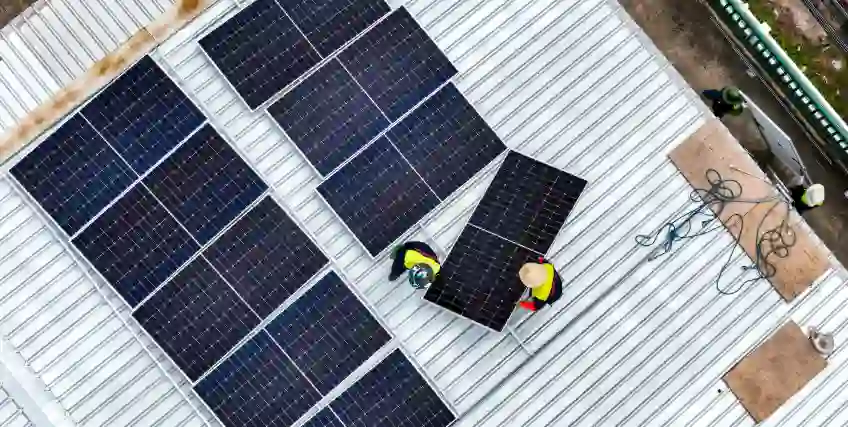Renewable Energy Project Financing: Your Guide to Sustainable Business Growth
Jul 11, 2025 | Last Updated on: Jul 14, 2025

Small business owners often turn to renewable energy to lower operating expenses and improve sustainability. However, the large upfront cost can be a major hurdle to taking on these upgrades. Renewable energy project financing enables entrepreneurs to implement clean energy solutions without paying the full amount upfront. Learn more about renewable energy project financing, including public and private financing options, the types of projects you can finance, and how to choose the right financing option for your situation. You'll also learn about alternative financing options that may be a better fit.
Why Companies Need Renewable Energy Project Financing
Energy costs continue to rise. Securing your own power source through renewable energy helps protect your business from unpredictable utility rate increases. Customers increasingly value sustainability, which can strengthen your reputation and attract new business.
In addition to financial and reputational benefits, renewable energy adoption may help your business stay ahead of evolving regulations. Many cities and states are introducing stricter environmental requirements. Investing in renewable energy now may help avoid compliance challenges later. Renewable energy project financing gives your business the financial tools to act decisively rather than react under pressure.
Renewable energy projects can also qualify for federal and state tax credits, such as the investment tax credit (ITC), which can significantly reduce the total cost. These tax benefits are especially relevant for capital-intensive infrastructure projects with long-term revenue potential.
Types of Renewable Energy Projects That Require Financing
Businesses pursue a variety of renewable energy systems based on location, industry, and energy needs. Common examples include:
- Solar power installations for rooftops or ground-mounted systems.
- Wind energy systems, particularly in open or rural locations.
- Hydroelectric projects, usually for facilities near water sources.
- Biomass and biofuel systems for agricultural or industrial operations.
- Geothermal energy for companies located in suitable regions.
All of these projects may qualify for renewable energy project financing, depending on the lender and scope of work. Choosing the right type of renewable energy solution depends on your business model, infrastructure, and long-term goals. Regardless of the project, renewable energy project financing can support your path to sustainable growth.
Solar projects in particular remain the most popular among small businesses. They are scalable, widely supported by tax equity markets, and typically easier to install and connect. As energy storage becomes more cost-effective, solar-plus-storage systems are becoming a standard offering in clean energy project development.
Types of Funding Available
Government Programs
Federal and state governments offer a variety of incentives to business owners who are undertaking renewable energy projects. These incentives may include tax credits, grants, or direct subsidies. Businesses that qualify can reduce their total project costs significantly.. The application process can be challenging, but the savings are often worth it. Your project may be able to combine government-backed programs with other forms of renewable energy project financing to provide even more savings.
Some programs also support construction loans, which can help cover initial costs before permanent project finance is secured. Construction loans often have specific covenants or reporting requirements during the construction phase. But they provide additional liquidity during project development to reduce the strain on your company's finances.
Green Loans
Green loans were designed to finance environmentally sustainable projects. Traditional banks, credit unions, and online lenders may offer these products with competitive interest rates. Compared to conventional financing, green loan approval may consider other factors, such as projected energy savings and environmental impact. Green loans make renewable energy project financing more attainable for small businesses that prioritize being eco-friendly.
Green loans may also be paired with power purchase agreements (PPAs), where a third-party developer installs and operates the system. In exchange, your business agrees to purchase power from the developer for a specific period of time. This reduces your upfront investment and spreads the cost out over many years. The reduction in energy costs should cover a significant share (or in some cases all) of the purchase power agreement payments.
Partnerships
Some businesses choose to form partnerships or joint ventures to reduce financial risk. By collaborating with other organizations, you can share both costs and energy output. This approach may be especially useful for commercial buildings, industrial parks, or business districts. With the right structure, a partnership can unlock new opportunities for renewable energy project financing that may not be available independently.
Working with a project sponsor or equity investor can also enhance your financing options. These stakeholders may bring capital, project management experience, or established relationships with lenders and suppliers.
How to Choose the Right Financing Option
Selecting the right financing requires evaluating your business's current financial position and project scope. Start by defining the size and purpose of your renewable energy installation.Assess your credit score, cash flow, and financial history. These will influence which lenders and terms are available to you. Understand the repayment timeline, down payment requirements, and total loan cost. Consider how long the system will take to pay for itself through energy savings or increased property value.
Consulting with a financial advisor who understands renewable energy project financing can provide additional clarity. Comparing multiple financing options will help you select a structure that aligns with your business’s needs and risk tolerance. Look beyond the interest rate’pay attention to flexibility, hidden fees, and the lender’s experience with loans for renewable energy projects.
Also consider how the financing structure affects your balance sheet. For example, some project finance models allow the creation of a project company that holds the asset and related liabilities separately from your core business, limiting financial exposure.
Alternative Financing Options to Consider
Conventional Business Loans
A standard business loan from financial institutions, like banks, credit unions, and online lenders, can be used to fund renewable energy upgrades. These loans may have higher interest rates and require a strong credit profile. Because traditional lenders may not specialize in energy projects, communication may require more explanation and documentation. Still, a conventional loan can be a viable form of renewable energy project financing when specialized programs are unavailable.
SBA Loans
The U.S. Small Business Administration (SBA) guarantees loans for energy-related improvements. SBA loans often offer favorable terms, including lower interest rates and down payments. To qualify, your business must demonstrate a clear repayment plan and the potential return on the energy investment. SBA-backed loans are one of the more reliable paths to renewable energy project financing, especially for growing companies.
Business Lines of Credit
A business line of credit provides flexibility. You can draw funds as needed and pay interest only on the amount used. This option works well for energy projects completed in phases or those with uncertain costs. Lines of credit allow for the strategic use of capital and can supplement larger renewable energy project financing plans.
Merchant Cash Advance
A merchant cash advance (MCA) offers fast access to funds by selling a percentage of future sales. It does not require strong credit, but it often comes with high fees. Use this option only if your business maintains consistent revenue and you need immediate capital. While not typically the first choice for renewable energy project financing, it can be a last-resort option in urgent cases.
Steps to Prepare for Financing
- Create a business plan: Define your energy goals, projected savings, installation costs, and timeline. The business plan should include financial projections showing how the savings benefit your business and a section on how this investment can set you apart from your competitors.
- Conduct a feasibility study: Evaluate whether your building, site, and utility access are appropriate for the chosen technology. Engage professionals who understand both the technical and financial aspects of the project you're considering. If you lease, be sure to get permission from your landlord if the project makes permanent changes to the building.
- Secure permits and approvals: Understand zoning, environmental regulations, and utility requirements in your jurisdiction. Interconnection timelines and procurement processes can affect financing schedules.
- Build a team: Work with financial advisors, engineers, and legal professionals who have experience in energy projects. The right expertise strengthens your application for renewable energy project financing.
- Check and improve your credit: Review credit reports, correct errors, and pay down existing debt to improve loan terms.
- Prepare your financial records: Lenders will request tax returns, cash flow statements, and other documentation to assess eligibility. Be thorough and organized.
Thorough preparation helps ensure compliance with lender covenants and enhances your chance of securing favorable debt financing terms. Be clear about your revenue streams and how you will service the debt throughout the project lifecycle.
The Bottom Line
Renewable energy project financing provides small businesses with a means to manage costs, comply with regulations, and enhance sustainability. With the right plan and financial structure, your business can benefit from clean energy without straining your budget.
Take the time to evaluate your financing options, apply for any grants for which you're eligible, and prepare your finances accordingly. Renewable energy project financing can support your long-term business goals and environmental commitments. Whether you're considering solar energy, energy storage, or other renewable energy sources, the right financing options will make your energy efficiency initiatives both practical and profitable.
FAQs About Renewable Energy Project Financing
What credit score do you need?
A credit score of 650 or higher is generally preferred. Some lenders accept lower scores if the business has solid revenue and a detailed project plan. Creditworthiness plays a critical role in renewable energy project financing approval.
Are there grants for small solar projects?
Renewable energy grants vary by state and industry. Explore local utility programs and federal grant opportunities to see what programs are available that match your project. Grants can reduce the total amount needed through renewable energy project financing because they don't have to be repaid.
Can startups qualify for renewable energy project financing?
It can be more challenging for startups to secure energy project financing because they lack a proven track record of making reliable payments to lenders. Lenders may approve a loan based on financial projections, a clear repayment strategy, and the experience of the company's owners and executives. Some green energy programs target new businesses entering the renewable energy space or those willing to invest in green energy projects for their business.
How long does it take to get financing?
The timeline depends on the lender and the type of loan or grant you're applying for. Depending on your needs, you should plan on the approval process taking several weeks, up to a few months. Proactive planning can not only accelerate your renewable energy project financing, but it can also highlight how thoroughly you've researched this project.
Do you need collateral?
Most lenders require collateral when applying for renewable energy project financing. The energy equipment generally serves as collateral, but some lenders may require a UCC-1 or other specific assets to back the loan. Having collateral may secure a lower interest rate or better terms when applying for renewable energy project financing.
Can you combine grants and loans?
Combining a grant with a loan for your business makes it easier for the green energy project to have a positive return on investment (ROI). Grants also reduce your financial burden, which can make it easier to secure financing for renewable energy projects.




